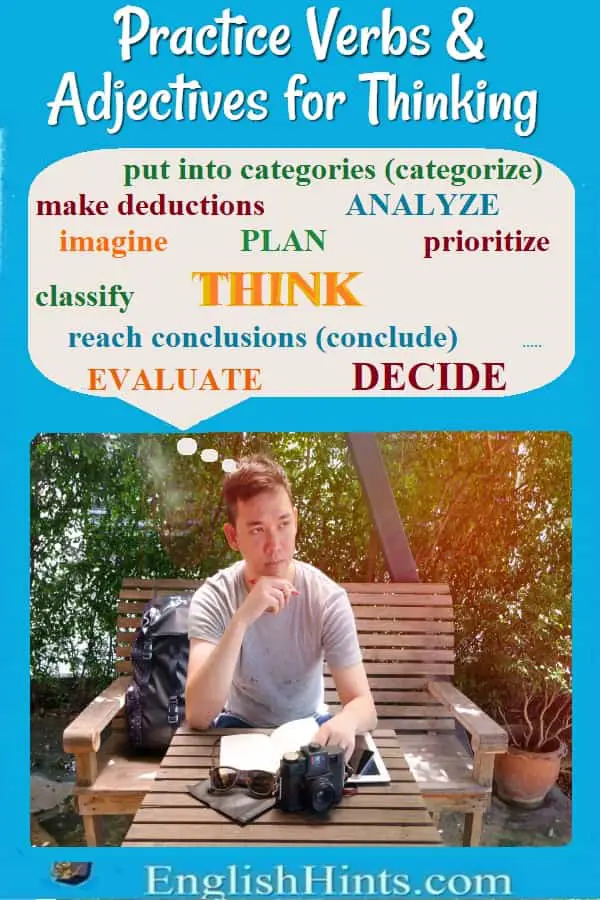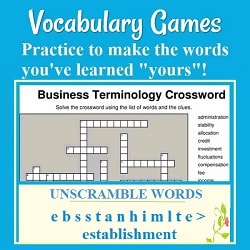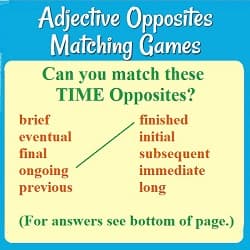Verbs & Adjectives for Thinking
How many verbs or adjectives for thinking do you know?
Can you describe or categorize various kinds of thought?
These two games let you practice English words for thinking. Choose the best categories for thinking verbs.
(For bonus points, see how many of the nouns related to these verbs you can list.)
Then match adjective opposites-- some quite familiar and others less common-- to add to your vocabulary for describing and analyzing thought.
(Note that some of these adjectives describe types of thinking, while others evaluate its quality: is it clear? well-reasoned?, etc.)
Start with the words you know, but don't be afraid to guess if there are some you aren't sure about. Simply concentrating on the words and looking for familiar roots will help you learn and remember them.
Put these Thinking Verbs into Categories
In your head or on a piece of paper, put these verbs for types of thinking into the most closely related category below. (One category will have a lot more than the others.) Answers below the Adjective Opposites Game. Bonus points: how many nouns made from these verbs can you name?
Verbs: assess, assume, categorize, choose, classify, comprehend, concentrate, conclude, decide, determine, differentiate, distinguish, evaluate, focus, grasp, identify, infer, know, recall, recognize, remember, select, sort, understand.
Thinking Categories
Attention:
Comprehension:
Grouping similar things:
Judgment:
Knowledge:
Memory:
Recognition of Differences:
Match these Adjectives for Thinking with their Opposites
Instructions: Match the words from the drop-down menu on the right with their opposites on the left (all from the Academic Word List.)
| abstract | ||
| ambiguous | ||
| aware | ||
| conceivable | ||
| convincing | ||
| complex | ||
| creative | ||
| deductive | ||
| focused | ||
| inaccurate | ||
| intelligent | ||
| rational | ||
| relevant | ||
| significant | ||
| specific | ||
| theoretical |
One explanation-- because this can be confusing:
Abstract is an adjective that refers to mental categories or ideas like ‘truth’ or ‘culture’ rather than physical things. However, an abstract (a noun) is a short summary before an article in an academic journal.
Verb Category Answers
Attention: concentrate, focus
Comprehension: comprehend, grasp, infer, understand (“Get it” also means to understand-- see Common Idioms.)
Grouping similar things: categorize, classify, sort
Judgment: assess, choose, conclude, decide, determine, evaluate, select
Knowledge: assume*, identify, know, recognize
Memory: recall, remember
Recognition of Differences: differentiate, distinguish
Give yourself 2 points for each right answer. (See below for the bonus list of nouns.)
* To assume is to think something is true because it seems likely or logical or it fits what you expect, without checking to make sure the situation is actually the way you think. So it isn't really knowing, but thinking you know.
Bonus: A Few Nouns for Thought Processes
Nouns related to the verbs listed at the top of the page:
assessment, assumption, category, choice, classification, comprehension, concentration, conclusion, decision, determination, differentiation, distinction, evaluation, focus, grasp, identification, inference, knowledge, recall, recognition, remembrance (though you’re not wrong if you said ‘memory’), selection, sort, understanding.
1 extra point for each right answer— the points can really add up!
Notice that many verbs can be converted to nouns by adding –ion (and others –ment or –ance.) See List of Suffixes for more conversion suffixes. A number of other verbs can be used as nouns without a change in form (or nouns have become verbs.)
English has many words for types of mental processes, with lots of synonyms and overlapping. Types of thinking include observation, recall, comprehension, categorization, comparisons and contrasts or differentiation.
Higher-order thinking may involve analysis (breaking ideas apart to critically examine their components) and synthesis (putting ideas together to create something new) as well as evaluation or judgment of the validity and usefulness of an idea or proposal.
We also have different words for thoughts: concepts, ideas, notions, theories.
We use both inductive and deductive reasoning to solve problems. (See Important Latin Roots for a brief explanation of the difference.) We talk about making and testing hypotheses, then evaluating the evidence before drawing conclusions. (See Scientific Method Vocabulary, which also discusses validity and bias.)
Try some related vocabulary matches: other Adjective Opposite Matching Games, Senses Vocabulary, and Roots of Comparison (which talks about metaphors and the thinking behind comparisons, as well as vocabulary for comparisons and contrast.)
You might also be interested in Greek Roots or Vocabulary from Classical Roots, both with a number of words concerned with thinking.
See also Write at Home’s good discussion of abstract and concrete nouns in writing (as well as thinking). It opens in a new window so you can come back here if you want.
Home> Online Vocabulary Games in English > Verbs & Adjectives for Thinking.
Didn't find what you
needed? Explain what you want in the search box below.
(For example, cognates, past tense practice, or 'get along with.') Click to see the related pages on EnglishHints.
| site search by freefind | advanced |









